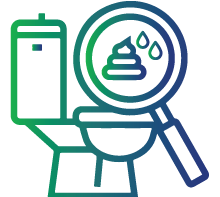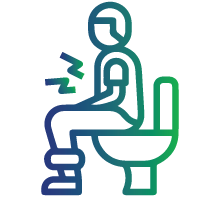
Stool Culture and Sensitivity
Stool Culture and Sensitivity
A stool culture test is done to detect the presence of disease-causing bacteria in the stool sample. It gives information about disorders related to the stomach, intestine, and other gastrointestinal (GI) systems.
A stool culture and sensitivity test helps your healthcare provider in diagnosing and treating infections related to the digestive and GI systems
What is stool culture and sensitivity test used for?
A stool culture and sensitivity test are indicated if the following signs and symptoms are noticed:

Bloody diarrhea

Chronic diarrhea

Abdominal pain and cramps

Fever

Nausea

Vomiting
Who should get tested?
A stool culture and sensitivity test is most likely to be ordered when a person is/has:

Symptoms of dehydration

Very old

Immune compromised

Symptoms of infection

Illness due to travelling in poor hygiene places

Food poisoning
Test preparation:
No special preparations are required for the test. You are instructed to deposit a freshly collected stool sample in the laboratory that should be free from outside contamination. Do not urinate while collecting the stool sample. To avoid this, it is always advised to urinate first before collecting the stool sample. Once you stop urinating, pass the stool into the container, close the lid, and wash your hands.
Please tell your healthcare provider if you are taking any prescription or non-prescription (Herbal or Ayurveda) medicines before taking the test
Interpretation of results
The test results for stool culture and sensitivity are given as either positive or negative for bacteria and are reported with the name of the specific pathogenic bacteria that was detected.
Positive test result:
It means there were bacteria detected in your stool sample which is the likely cause of your infection.
Negative test result:
It means there were no bacteria detected in your stool sample. Thus, no infection was found.
The most common pathogenic bacteria detected in stool samples are:
Campylobacter – It is found in undercooked or raw poultry and unpasteurized milk.
Salmonella – It is found in raw eggs, raw poultry, and undercooked vegetables.
Shigella – It is found in food and water that is contaminated with stool from infected persons.
Escherichia coli – It is found in undercooked or raw beef/hamburger, spinach, or unpasteurized cider.
Clostridium difficile – It is a part of the normal flora in our body. However, overuse of antibiotics may cause excessive growth of this bacteria.
A few less commonly found bacteria include Aeromonas, Plesiomonas, Yersinia enterocolitica, and Vibrio cholerae.
FAQs
What is the turnaround time (TAT) for stool culture and sensitivity test?
The test results for stool culture and sensitivity are usually available within 2 -3 working days after the sample collection. However, it could also take a little longer at times
Are there any risks associated with stool culture and sensitivity test?
There are no risks associated with stool culture and sensitivity test. You are just instructed to collect your regular stool sample for testing which involves no risk
I have had a pathogenic bacterial infection in the past and got treated. Is it possible to get re-infected?
Yes. If you have been exposed to places with poor hygiene or infection spread, you may become re-infected. You may develop short-term immunity to a specific strain of bacteria with which you became infected, but you may become ill as a result of other strains and types of bacterial infections.
What medications could affect my test results of stool culture and sensitivity?
The results of stool culture and sensitivity test are affected by many medications which include antibiotics, anti-diarrheal medicines, enemas, and laxatives
What is the difference between a stool routine and stool culture?
Whenever a person has stomach issues, a stool routine is suggested in order to help doctors understand what's going on. It detects bacteria, pus cells, and blood cells in the stool sample.
A stool culture is a test that detects the presence of specific disease-causing bacteria that is leading to an infection in the stool sample.
If the routine stool test reveals any evidence of bacteria, a stool culture is requested

